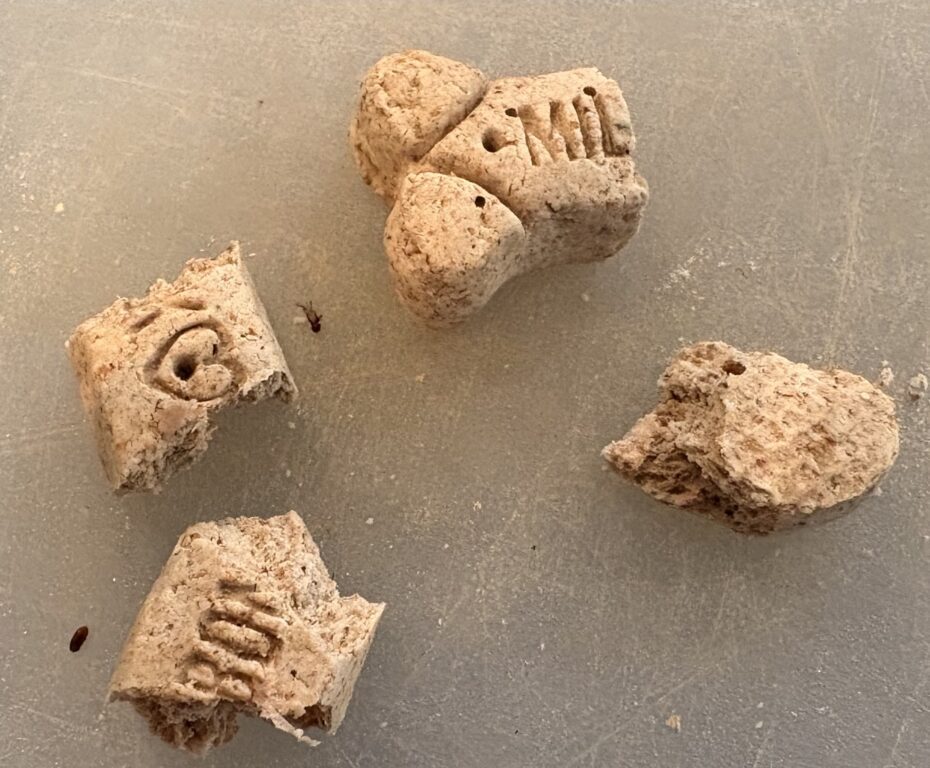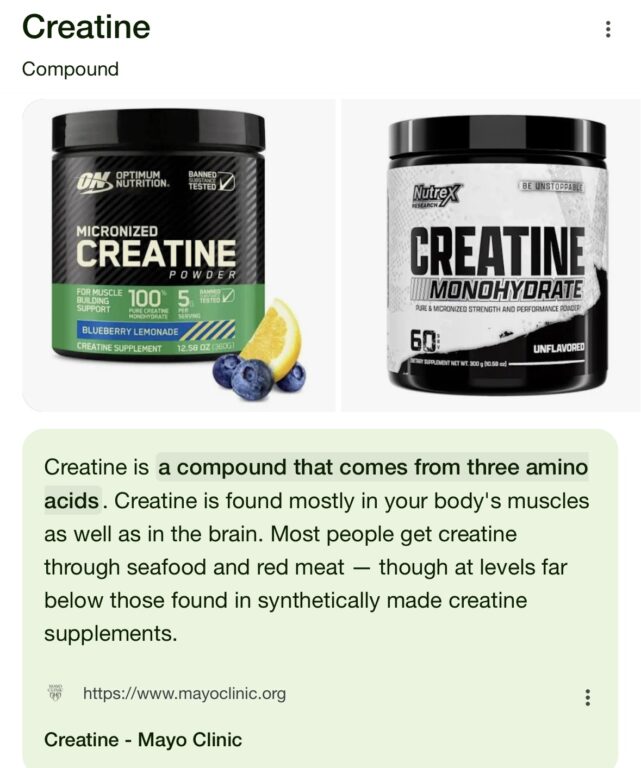Consumer Diary: Milk-Bone, Creatine

Audio By Carbonatix

Our dog Latke would love to chomp on this Milk-Bone biscuit, but because it contains tiny weevils that may be causing chronic diarrhea, we won’t let her eat it. Photo credit: Harlan Levy
Consumer columnist and West Hartford resident Harlan Levy has more than 20 years of experience writing stories about everyday experiences that anyone could encounter.

Harlan Levy. Courtesy photo
By Harlan Levy
I’ve been giving our dog Latke a medium-size Milk-Bone every night before bedtime. Have for more than a decade. She expects it and demands it. Meanwhile, for several months she has had a continual case of diarrhea. We wondered if somehow they were connected.
Then, last week I noticed little holes in the Milk-Bone I was about to give Latke. Then two little bugs crawled out. Uh oh! I looked in the big box of Milk-Bones that I had been taking them from, and all the Milk-Bone biscuits I scooped up had the holes. That night – and ever since – we have not given Latke her nightly Milk-Bone, substituting other snacks she loves.
We immediately did some online research, searching for “Milk-Bone diarrhea.ʼʼ
On [email protected], dogforums.com, and others we found lots of complaints like ours. Hereʼs a sampling of a dozen similar comments:
- “This boy has been having diarrhea on and off for the past few days … after we opted for Milk-Bone treats. He never would go in the house, but 2 days out of the past 5 we come home from work and there is a poops mess by the door and bathroom rug. He also has runny poops when he goes out. I think it may be Milk-Bone related.”
- “My Italian greyhound had a Milk-Bone biscuit for the first time ever about three hours ago. Then he had diarrhea in the car and begged for us to let him out again during our road trip. He’s out of it. Never again.”
- “My dog will occasionally get sick with bouts of diarrhea and very upset stomach. She won’t eat and has to go outside almost every 20 minutes. I was curious as to what was making her sooo sick. She eats the same food she always has. The only change was the Milk-Bones. I stopped giving them to her and she was better.”
- “My dog always eats the same food. Then I started giving her Milk-Bones, and she had diarrhea. I stopped the Milk-Bones, and she was better. Just today, my nieces gave her a total of two, and this evening we are having the same issue. It has to be the Milk-Bones.”
- “I gave my dog one Milk-Bone every night before bed, and he would get up in the morning throwing up. This went on for a long long time, and I couldn’t figure it out. So I did research and found out it might be the Milk-Bones. So I stopped them, and he never got sick again!!”

These bits of a medium-size Milk-Bone biscuit are the homes of lots of tiny weevils, visible at left. They may be causing our dog’s chronic diarrhea. Photo credit: Harlan Levy
We also called our longtime veterinarian, Dr. Zee. She doubted that the Milk-Bones were the culprit, or that the weevils did it. “Theyʼre just protein,ʼʼ she said. She told us to get ProViable, an over-the-counter gut health supplement with probiotics.
Meanwhile we changed her dog food to what Dr. Zee recommended, Royal Canin. Since her last bout we stopped the Royal Canin, and weʼre feeding her rice with chicken, and the diarrhea has stopped, but we still donʼt know what caused her malady. But no more Milk-Bones for now. We’ll try ProViable or a stronger version.
Creatine
I was checking recent science news that can benefit consumers and found this June 10th article about a Texas A&M University report. It stated that the supplement creatine, once seen as a gym-only item popular with athletes for its ability to help build strength and power, is now understood to play a vital role in cellular energy, cognitive function, and healthy aging.

Courtesy of Harlan Levy
“From boosting memory and reducing fatigue to preserving muscle mass over time, creatine is emerging as a powerful tool for everyday wellness,ʼʼ the scientists said. “Despite persistent myths about bloating or safety risks, a vast body of research shows it’s both safe and effective for nearly everyone, especially those who donʼt get enough from diet alone.ʼʼ
The compound’s usefulness extends well beyond the gym, said Dr. Richrd Kreider, professor and director of Texs A&Mʼs Exercise & Sport Nutrition Lab, whoʼs spent more than 30 years investigating the effects of creatine, a naturally occurring compound stored in the muscle that combines with phosphate to form creatine phosphate, which is needed for cellular energy.
“When the body is stressed, like in exercise or under metabolic conditions like some diseases, creatine phosphate is needed to maintain energy in the cell, and therefore has a lot of protective and health benefits,” Kreider said.
Our bodies create about a gram per day, but it’s recommended to get 2 to 4 grams of creatine per day, depending on muscle mass and activity levels. According to Kreider, most people fall short of getting enough creatine from diet alone. The best sources of creatine in the diet are meat and fish.
“You only get about a gram of creatine per pound of red meat or fish, like salmon, so it’s expensive and takes a lot of calories to get a gram,” Kreider said.
Kreider recommended creatine supplements, 5 to 10 grams per day.
Beyond boosting athletic performance, creatine is important for everyone as they age, Kreider said. It can help older adults who lose muscle mass and cognitive function as they age, he said, and in adolescents, low dietary creatine intake is associated with slower growth, less muscle mass and higher body fat.
Now you know.
NOTE: If you have a consumer problem, contact me at [email protected] (“Consumer” in subject line), and, with the power of the press, maybe I can help.
Like what you see here? Click here to subscribe to We-Ha’s newsletter so you’ll always be in the know about what’s happening in West Hartford! Click the blue button below to become a supporter of We-Ha.com and our efforts to continue producing quality journalism.




Thought you might be interested in Kreider’s “Conflict of interest statement”, published in connection with his 2021 “Creatine in Health and Disease” article at https://pubmed.ncbi.nlm.nih.gov/33572884/: “R.B.K. has conducted industry sponsored research on creatine, received financial support for presenting on creatine at industry sponsored scientific conferences, and has served as an expert witness on cases related to creatine. Additionally, he serves as Chair of the Scientific Advisory Board for AlzChem who sponsored this special issue. J.R.S. has conducted industry-sponsored research on creatine and other nutraceuticals over the past 25 years. Further, J.R.S. has also received financial support for presenting on the science of various nutraceuticals, except creatine, at industry-sponsored scientific conferences.”